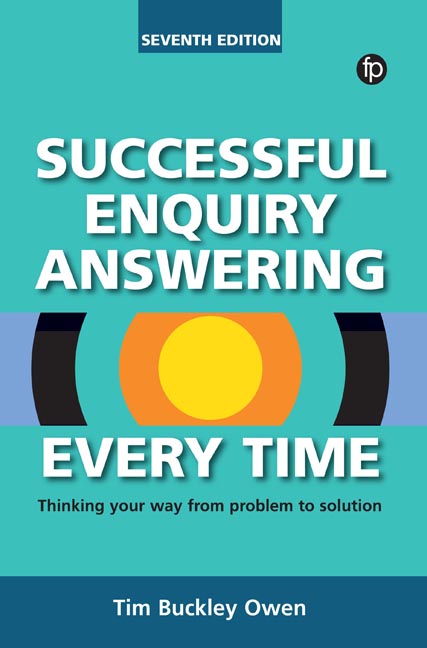Book contents
- Frontmatter
- Dedication
- Contents
- Introduction: Why thinking skills matter
- Eight essential thinking skills for successful enquiry answering
- 1 What do they really want? Using your analytical thinking skills to understand the question
- 2 Why remote enquiry handling is different Anticipating problems by thinking empathetically
- 3 Getting started Dealing with the panic by thinking imaginatively
- 4 Smarter searching Developing efficient search strategies by thinking systematically
- 5 Help! Everything's going wrong Using lateral thinking to get out of difficulties
- 6 Success! Now let's add some value Using your creative thinking skills to present your answer well
- 7 Don't just give me another reading list! Using critical thinking skills to add further value to your answer
- 8 Choosing your toolkit Using your predictive thinking skills to determine the resources you'll need
- Index
- Miscellaneous Endmatter
8 - Choosing your toolkit Using your predictive thinking skills to determine the resources you'll need
Published online by Cambridge University Press: 08 June 2018
- Frontmatter
- Dedication
- Contents
- Introduction: Why thinking skills matter
- Eight essential thinking skills for successful enquiry answering
- 1 What do they really want? Using your analytical thinking skills to understand the question
- 2 Why remote enquiry handling is different Anticipating problems by thinking empathetically
- 3 Getting started Dealing with the panic by thinking imaginatively
- 4 Smarter searching Developing efficient search strategies by thinking systematically
- 5 Help! Everything's going wrong Using lateral thinking to get out of difficulties
- 6 Success! Now let's add some value Using your creative thinking skills to present your answer well
- 7 Don't just give me another reading list! Using critical thinking skills to add further value to your answer
- 8 Choosing your toolkit Using your predictive thinking skills to determine the resources you'll need
- Index
- Miscellaneous Endmatter
Summary
‘Give us the tools and we will finish the job’, said Winston Churchill famously during World War 2 – and that's the stage we've reached too. Up to now we've tended not to mention specific sources or products by name but just to refer to them generically. This is a manual about skills, after all – not a sourcebook. But if you've stuck with us this far, you'll be aware that we've referred to search engines, enquiry tracking systems, library management systems and the discovery facilities they can offer, reference management software – and above all specific information sources that can get you started on a whole range of enquiries. So this final chapter includes links to a selection of resources that you might find useful in your enquiry work. None of the lists in this chapter are exhaustive, and professional peers may dispute some of the choices. But hopefully they'll be enough to give you a flying start.
But before we launch into those, we still mustn't lose sight of the fact that the best single tool at your disposal is your ability to think your way from problem to solution. We've seen that at work throughout the book, and it applies just as much when you're planning a shopping expedition for resources that can help you in your enquiry work. It should be pretty obvious, really, that you can't reach any decisions on how to tool up until you've worked out what your enquirers are likely to need and the demands you can expect them to put on your service. This is true whether you're providing information to the public, to an academic community or to your colleagues and clients in a specialist organization. It requires some detailed thought before you take any irrevocable decisions, and brings in yet another thinking skill: predictive thinking.
Making best use of your Time, Intellect and Money
Every service you provide, and every tool you acquire, is likely to consume three principal resources in different degrees: your Time, your Intellect and (of course) your organization's Money. Clearly everything you do involves money in terms of the time you devote to each task. But only one of these three involves hard cash – the one resource that is overtly limited in terms of your budget – and that's Money. The other two resources are limited only by your ability.
- Type
- Chapter
- Information
- Successful Enquiry Answering Every TimeThinking your way from problem to solution, pp. 159 - 172Publisher: FacetPrint publication year: 2017



